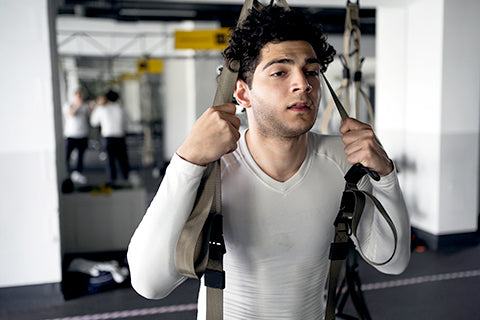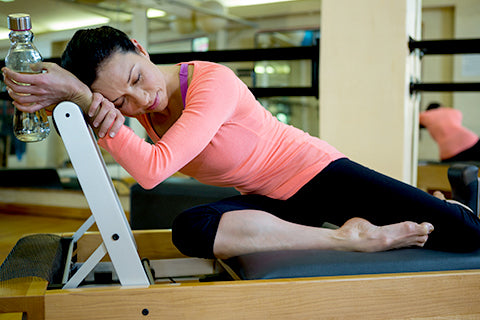March 28, 2024
Madhura Mohan
Worst Things To Do Before Your Workout
I
t's human nature to focus on the right things to do and overlook the wrong things to do. Sometimes quitting certain behaviours is a better strategy for achieving goals than increasing effort. The knowledge of what to do and what not to do is complementary. Making mistakes can be prevented by knowing what to do as well as what not to do. Are you thinking that we are teaching you some valuable life lessons here? It's okay if you think that, however in this blog post we'll discuss some of the worst things you can do to undermine your fitness objectives before working out…
EATING HEAVY MEALS
Although it's crucial to feed up before a workout, eating large meals can hinder your performance. When you exercise after a large meal, your body directs blood flow toward your digestive system. A large meal demands a lot of energy to digest, which can make you feel exhausted and lethargic when working out. Your body will use the energy to break down the food, not to power your workout.
Eating large meals right before working out can cause bloating, nausea, acid reflux, and cramping in the stomach throughout the workout.
Your body will use the recently consumed food as fuel rather than utilizing your fat stores if you eat substantial meals before exercising. You therefore won't be able to get the most out of the fat-burning advantages.
If you consume large meals right before working out, your body might not be able to properly process and absorb the nutrients from the food. This might cause problems with nutritional absorption and have clear negative impacts on muscle growth and muscle repair.
FASTING BEFORE A WORKOUT
Fasting right before an exercise session might deplete you of your body's immediate energy source, or glycogen stores, which can lead to low energy, weariness, and poor performance.
Exercise during fasting may cause your body to use a process called gluconeogenesis to break down muscle tissue for energy, particularly if your glycogen stores are low.
When blood sugar levels fall during a fast, it can result in lightheadedness, dizziness, and even fainting when exercising.
Working out on an empty stomach can cause impairments in concentration, coordination, and reaction speed, which increases the risk of injury, especially during high-intensity activity.
Insufficient nourishment can make it difficult for your body to maintain good form, which can result in joint and muscle injuries.
NOT DRINKING SUFFICIENT WATER
Maintaining energy levels, controlling body temperature, and avoiding muscle cramps all depend on sufficient hydration. Your body won’t have enough fluids to cool itself through sweating when you don't drink enough water before an exercise session. Heat exhaustion and heatstroke can result from overheating as a result of this.
Dehydration can cause an electrolyte imbalance, impair nerve function, cause muscles to contract, and raise your heart rate.
Dehydration can hinder the body's ability to recover by slowing down the transport of nutrients, causing muscle cramps, disorientation, decreased endurance, strength, power, coordination, and the capacity to maintain intensity throughout workouts.
DRINKING TOO MUCH WATER BEFORE A WORKOUT
While being hydrated is crucial for peak performance, consuming excessive amounts of water before exercise can result in hyponatremia, often known as water intoxication.
Excessive water consumption lowers blood sodium levels, which can upset the electrolyte balance and cause symptoms including headache, nausea, and cramping in the muscles.
A large water intake before exercise might lead to gastrointestinal irritation and bloating, which can impair your ability to perform at your best during the exercise. When participating in endurance sports like long-distance cycling or marathons, it's critical to keep this condition in mind.
TOO MUCH CAFFEINE
Caffeine is a central nervous system stimulant and consuming caffeine can no doubt help reduce perceived exertion, enhance mental focus, and make you feel mentally prepared for your workout.
Overdoing caffeine does not provide the same benefits, it leads to restlessness, rapid heartbeat, gastrointestinal distress, anxiety, diarrhoea, heartburn, and stomach cramps.
Caffeine is a diuretic, meaning it can increase urine production if consumed in excess quantity. This can lead to dehydration which can impair exercise performance.
Too much caffeine can lead to increased contractions in the colon and induce more bile production which will increase bowel movements.
NEGLECTING MENTAL PREPARATION
While physical readiness is essential, having the right mindset before going to the gym can play a significant role in your workout routine.
If you are mentally unprepared for the workout, it can lead to poor motivation, poor focus, poor form, increased risk of injury and a less effective workout. If you are mentally unprepared, it can lead to decreased enjoyment of workouts and make you feel overwhelmed by the prospect of exercising. Set your goals, and do positive self-talk to achieve better results. Distractions can hinder your focus and disrupt the flow of your workout. Clear your mind of external thoughts before heading to the gym and commit to being fully present during your workout.
SKIPPING WARMUP
Skipping warm-up exercises might seem like a time-saving strategy, but it can hinder your fitness journey. Warm-up sets are essential components of a successful workout routine. Neglecting these practices not only increases the risk of injury but also limits your overall workout efficiency. Warm-ups help increase blood flow to muscles, raise the body’s core temperature, enhance flexibility, and improve joint mobility. Warm-up sets effectively prepare the body for the heavier lifts and movements that lie ahead. Neglecting this crucial step can lead to stiff muscles, joint injuries, decreased mental focus, and can contribute to delayed onset of muscle soreness (DOMS) and decreased exercise efficiency. Spend at least 10-15 minutes performing dynamic stretches, light cardio, and mobility exercises to prime your body for the workout ahead.
OVERDOING STATIC STRETCHES
While flexibility is important, Static stretching (holding a stretch for an extended period) before a workout (when muscles are not properly warmed up) may negatively impact muscle activation and force production, can make muscles more prone to strains, and compromise your ability to perform at your best during the workout. Excessive static stretching before exercise can decrease muscle activation, lead to muscle fatigue, make your muscles more prone to strains and impair performance.
Reaching fitness objectives and maximizing workout output calls for more than just going to the gym…
While there are countless tips and strategies for how to improve your workout routine, it’s equally important to know what not to do before workouts…










 Follow our Instagram page for the latest updates: badalkhudko
Follow our Instagram page for the latest updates: badalkhudko




Leave a comment